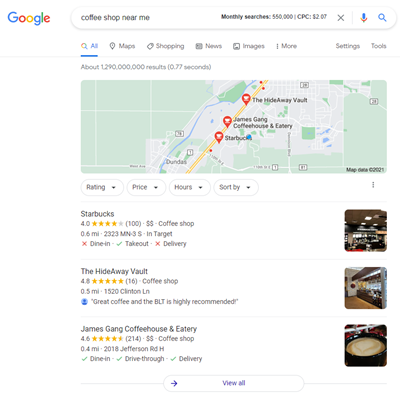
The BA Group
April 9, 2021
The Basics: What is local SEO?
If you have anything to do with your credit union's website, you’ve probably heard of search engine optimization (SEO) and its importance in helping you to rank well in organic search results and increase site traffic. Local SEO is exactly what it sounds like – optimization efforts to help your credit union's visibility and ranking specifically within local search results.
Why Should You Care About Local SEO?
- It’s budget friendly.
One of the main reasons why local SEO is a great resource for small and local credit unions is because it is an inexpensive and accessible way to improve your online presence and ranking in comparison to most advertising efforts. Google My Business and many other online listings are free to create and manage, as are social media pages. For smaller credit unions or those without a strong budget for paid advertising efforts, local SEO is a great organic and inexpensive place to start.
- It helps you reach a local audience.
Ranking well in local searches ensures that your credit union is reaching a relevant audience based on both what they’re looking for and their location. For example, a credit union that only serves a certain city or county will benefit more being seen by a resident of that area than someone hours away. Local SEO takes into consideration location and proximity to ensure that they are being seen by the most relevant searchers.
- You’ll likely reach (potential) members who are ready to buy.
Ranking well in local searches, specifically “near-me” and “where to” searches is an opportunity to reach potential members in their ready-to-engage moment. Statistically, 76% of people who search for something locally on mobile will then visit a business within 24 hours. With these users often ready to make a decision, investing in local SEO can help you appear as one of the top choices, particularly if you appear in the local 3-pack (see more below).
What Is The Google Local 3-Pack?
Convenience is king. Like traditional search results, Google ranks local results based on a number of factors while also taking into consideration location. In general, 92% of searchers choose businesses on the first page of local search results, and that’s why you hear so much about appearing on the first page in the world of search. But with local search, Google also has what is called the local 3-pack (see photo to right).
The 3-pack is the top three search results for a local search. Appearing in the pack is the local SEO equivalent of appearing on the first page of search results and also appears as a popular or trustworthy result to searchers. The 3-pack is a good way to see who is ranking best for your product or service in the area, and regularly checking where you appear in local search is a way to measure the effect of your local SEO efforts.
Ways To Improve Local SEO
- Create or claim your Google My Business listing.
Google My Business (GMB) is one of the most popular and important listings for local SEO ranking. If your credit union does not yet have a listing, you can create one. If you are unsure or unable to access the account, Google has instructions for that as well. Fully optimizing your GMB listing could be an entire blog post itself, but a good place to start is making sure to include as many details as possible and think about what information people would want or need to know about your credit union. I’ll talk a little more about this in the keyword section below, but make sure you’re thinking of how people may be searching for you when you’re writing descriptions and other details on your credit union listing and other review sites.
- Check for other local listings and review sites.
In addition to the Google My Business listing, update or create accounts on other relevant review sites like Yelp, Foursquare, etc., as well as any local listings that may be relevant to your credit union. The more places your credit union information is listed, the more places Google can find it, and the more opportunity for inbound links and reviews.
- Write content that is locally relevant.
Blogs and articles are great for SEO in general, and writing content that is relevant to your area and members can help your local ranking as well. Use this content as a place to not only mention your products and services, but to also include keywords that mention your local or field of membership area, your potential member groups, and local news and events when applicable to make you more relevant to local searches.
- Keyword research.
Brainstorm how people may look for your credit union in your area when thinking of keywords to research and optimize for. For instance, make sure to account for both people looking for a credit union, financial services, or bank as well as people looking for your specific credit union by name. Think about “near me” searches and locations people may include, as well as long tail keywords and phrases to optimize for voice search. Consider synonomous terms people may be using in their searches (finance/loan, bank/credit union) and utilize the autocomplete feature on Google to see how people are searching for things. Google’s keyword planner is a great place to start for keyword research.
Optimizing Your Website for Local SEO
Like with other branches of SEO, optimizing your website is an important factor to rank well in local search results. It also only makes sense to have a good website with valuable information if you’re going to spend the time and effort pushing people to it. In addition to traditional SEO efforts, some key ways to better optimize your website for local SEO are:
- Create a contact page.
Be sure to include as much information as possible to let people Google and users know where and how to reach you. This includes your credit union address(es), hours, phone numbers, relevant email addresses, a map (this saves the searcher the time of looking it up in Google Maps themselves), etc. Think of information that would be important to someone trying to visit your credit union location(s) and include it. In addition to adding this information, making it clickable is a great way to ensure that users landing on your site can easily contact you, especially on mobile.
- Make sure your site is mobile-friendly.
If you’ve managed to get someone to your website, don’t lose them with a bad user experience or site that isn’t optimized for their device. Mobile optimization includes making sure your site is responsive, checking its speed, removing pop-ups, and more. Keep in mind that 61% of mobile searchers are more likely to contact a local business if they have a mobile-friendly site. Check out Google's free Mobile-Friendly Test to see if your site is mobile-friendly.
- Add reviews and testimonials (or ask for them).
It may seem like common sense that reviews can impact a person’s decision of whether to choose your credit union, but it’s important to note that they can also help with your Google SERP ranking. Google rewards sites that it deems trustworthy, and reviews are a sign of that and can help boost local SEO performance.
Other Local SEO Tips:
- Consistency is key.
Make sure that the information about your credit union is consistent across all platforms like your website, social media, and credit union listings. Contact information, hours, web addresses, names, etc. should match across all accounts so when Google is indexing it is finding the information to be consistent and more trustworthy.
- Regularly check and update your business listings.
Having a Google My Business listing is the first step, but managing and regularly updating it is also important. Updating the information about your credit union to be correct and match what is on your website as well as responding to reviews, posting, and engaging with users will also help your local SEO and make your listing and credit union seem more trustworthy.
- Look at your GMB suggested edits.
The public can suggest edits to the information on your Google My Business listing and tracking those can be helpful in ensuring the listing is as accurate and helpful as possible. In some cases the edits may be valid, like holiday closures or change in hours. In other cases, there may be suggestions that are not correct but can give insight into how people view your credit union or things to highlight. For example, if someone submits an edit to say your credit union isn’t handicap accessible when it is, it might be a hint to make that information more prominent or include photos in the listing.
Key Takeaways:
- Local SEO is an approachable, affordable tactic to increase the local visibility of your credit union
- Ranking well locally helps to reach a local, relevant, and ready to engage audience
- Complete and consistent credit union profiles and information are a key factor in local SEO
- Keep in mind that a majority of local search happens on mobile and optimize for it
- Like traditional SEO, local SEO is an ongoing effort, so review your profiles and content regularly and update as required
Need local seo help for your cu?
Contact our digital marketing team today!